#revolutionary girl utena meta
Text
SA Mention //
The cantarella scene in Utena is so so so good and nearly every bit of it has been analyzed over the years (for good reason!). But can we take a moment to talk about how the music skips?
Right after Anthy suggests she poisoned Utena's cookies. The background music starts skipping. It's an obvious loop too, once you hear it, it's hard to unhear. The music doesn't pick back up until after Utena admits to poisoning the tea, AFTER the spinning red rose. It picks back up at "The tea is delicious".
At the most basic level, the skipping is just another method by which RGU creates emphasis.
But it just. It can't help but remind me of the most significant case of music skipping in the franchise. In Adolescence of Utena, right before E-Ko and F-Ko show the tape of Anthy's assault (another scene which has to do with something being put in Anthy's drink).
So then, the skipping could represent honesty. The brutal, uncomfortable bearing of the truth. Statements that ring in the ears and choices that maybe aren't the most delicate or harmless but had to convey the intended message somehow.
(If anyone else has watched seebeees' video essay on transfeminism in utena [which you should, it's really good], it reminds me of their point on the way Adolescence could be using static to represent Anthy's trauma. Records and CDs skip when something has dirtied them. Scratched them. Damaged them).
It could represent repetition obviously, but it could also represent the exact opposite. A breaking of the cycle, a momentary reprieve from the looping record that is Anthy and Utena's lives at Ohtori. When they confess their love for each other in that moment, in such an odd and uniquely utenanthy way, it catches the narrative off-guard. They are cracking the shell of their egg. Their love is forcing itself through the narrative.
#revolutionary girl utena#rgu#shoujo kakumei utena#sku#utena#utena tenjou#anthy#anthy himemiya#utenanthy#adolescence of utena#rgu meta#utena meta#revolutionary girl utena meta#rgu analysis#utena analysis#revolutionary girl utena analysis#SA mention
774 notes
·
View notes
Text
Utena - Analysis on the opening
I don’t know if someone has already done it, but here’s my interpretation of the opening.
Warning: very, VERY long post and mention of scenes from the show, enough to be considered spoilers (sorry 😅)
Edit: I’ve made an analysis on the first ending as well

Let’s live heroically, let’s live with style. (Just a long, long time.)
The opening starts with our two main characters naked and in a fetal position, indicating their status of “newborn” in the story. Then, they are clad in the garbs of their respective roles. Interestingly, despite facing and leaning toward each other, their eyes remain close. In the case of Utena, it symbolizes her inability to see beyond her own narrative of the heroic prince saving the princess. As for Anthy, it’s her resignation to not see anything beyond her role of Rose Bride which she has played for decades/centuries, hence the long, long time.

Even if the two of us are torn apart… (Let go of me…)
…take my revolution.
In the next sequence, not only are they not looking at each other, but they are also back-to-back, another indication that they are positioned to be at odds with each other, whether they want to or not. Still, despite the obstacles thrown at them, despite Anthy’s attempts to make Utena give up on her (“Let go of me…”), the latter doesn’t stop telling her to take her hand (revolution) and that’s what she did.

In the sunlit garden, we both joined out hands.
Miki’s sunlit garden is an idealized memory, so it makes sense to compare Utena’s goal of becoming a prince to the former. Also, the tower, where her journey is supposed to end with her heteronormative “happily ever after”, is where she and Anthy join hands and the latter’s revolution begins.
The sequence where Utena walks with the male students has a “one of the boys” kind of vibe and that might have been the intent. The tomboy character may appear progressive by refusing to conform to traditionally feminine gender norms, but that’s instead a sexist concept because it implies that Utena’s gender, her femininity (and by association, anything branded as “girly”), is the one thing that makes her less than her fellow male schoolmates. Also, she looks over her shoulder, something or someone (Anthy?) catching her attention which stops her from blindly following the other boys’ lead.

Drawing close for comfort, we both swore…
In Anthy’s case, due to her hair and skin color, the vibe she emanates as she walks with her fellow female schoolmates is “not like other girls”, another trope which hurts women by marginalizing the few “different/special ones” from the “normal/average ones” or vice versa. However, the reason she turned around (Utena? Her perspicacity?) is what helps her preserve the part of her identity which is still deep within her. So being different isn’t a bad thing as long as every person, especially girls, are given the same courtesy.
If you read the Japanese lyrics, you would know chikai (from chikau, meaning “to swear/vow”) is at the beginning of Anthy’s sequence, when we see the gates of Ohtori, where she swears to find Utena again.
(Also, did you notice that their respective sequences begin with a shot of where their story in Ohtori ends?)
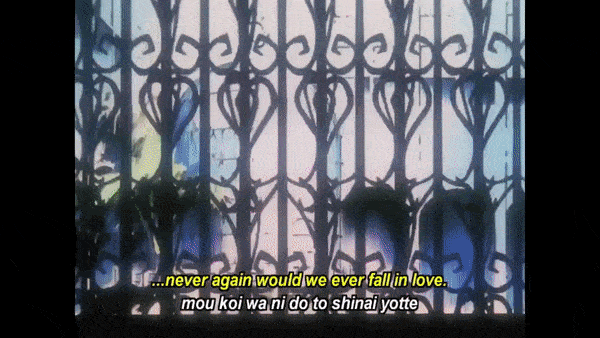
…never again would we ever fall in love. (Every time.)
This line is sung as our two protagonists stand face to face in Anthy’s cage-like greenhouse, where the cycle of the quest for revolution always (re)starts. That vow of never falling in love again, along with that Every time, makes me wonder about how many games had taken place before Utena. How many times had Anthy been engaged to a “chosen one”? How many of those “chosen ones” did she grow to love, yet still choose to betray? How many times did she swore to never love another again only to do so despite said promise to herself? Utena, by ending the cycle, makes the vow mentioned before much sweeter: she and Anthy choose to never fall in love again because they have pledged their love for each other till death do them part (like a married couple 🥰🤵🏻♀️👰🏾♀️🥰).

I see that photo of us standing cheek to cheek…
…and place a bit of my loneliness in our smiles. (Revolution!)
At this moment, the past represented by Utena and Anthy lying down, facing each other, and the future represented by the lyrics paralleled each other.
Past: a (naively) smiling Utena and a (falsely) smiling Anthy -> Anthy gives the white rose, the symbol of the Prince and by association, patriarchy, the source of her eternal pain, to Utena who is unaware of the dark history connected to it -> (failed) Revolution by dueling (transition to the dueling arena)
Future: the photo at the end of Episode 39 -> Anthy’s longing for Utena -> (successful) Revolution by leaving Akio

Even if I dream, even if I cry, even if I get hurt…
…reality keeps on coming recklessly.
This sequence is about the Duelists.
Utena being the one who dreams is self-explanatory.
Saionji, if you pause at the right time, is seen with tears in his eyes. Behind his arrogant attitude is nothing but a mentally weak and insecure boy who throws violent tantrums when things don’t go his way.
Juri is no doubt the one most hurt in the series, not only because of her gender, but also because of her sexual orientation (I’ve made a post about it).
Miki and Nanami being the ones hit by reality makes sense due to the knowledge they idealize the relationship they shared with their respective siblings when they were children.
But what about Touga? Maybe it’s the confidence that he could get the power to revolutionize the (his) world if he emulates the system which had hurt him only to realize that such way of doing things won’t get him closer to his goal. Or, since he’s the first antagonist of the show, giving us a taste of what Akio, another male character whose inside is the opposite of his princely front, could do to girls, maybe he represents the reality/truth of the (imperfect) world.
All these Duelists, these teenagers, fight each other for a purpose and that later turns out to be futile after they find out that the rules they play by are a cover for a much more sinister plot.

I wanna find my own place, the value of being…
The first half, we focus on Utena who raises her sword with a determined look as the blue sky turned golden and the dueling arena crumbled. Utena rejects the narrative Akio wants for her and in the process, breaks the world he has created (and kept Anthy in).
While we zoom in on Utena, symbolizing her will to move forward, it’s the opposite with Anthy. Expression blank, she put some distance between her and Utena/the viewer(s), letting herself (her true self) disappear with Akio’s self-made world.
This sequence foreshadows what will happen in Episode 38.

…the person I’ve been until now…
But as it is shown in Episode 39, Anthy didn’t disappear in the fall of Akio’s world and stood up against her brother (riding a horse), mirroring Utena.
Also, we see Dios opens his eyes as the dueling arena crumbles to dust.
In Episode 13, Akio is conversing with a “sealed” Dios who “glare[s] at” him for wanting to bring the Prince back into the world. Dios had been “sealed away” because playing Prince had been killing him. Anthy had become the world’s sole target of their hatred so that he would no longer carry that great burden on his shoulders ever again. Dios is angry at Akio for not only trying to turn her sacrifice into a fruitless endeavor, but for also taking part in her eternal torment by making her an accomplice in his scheme.
Akio has internalized the teachings of patriarchy. He now idealizes the Prince, forgetting that his current self isn’t the result of Anthy sealing the latter’s power away. He had, of his own volition, casted away his “nobility” and enjoyed the privileges of his gender. He was free of the duties expected from the Prince yet chose to not use that freedom to search for a way to save his sister without taking on that mantle again. Protected by a patriarchal system, Akio is in fact afraid of carrying the weight of the world on his shoulders again despite his desire to return to his “glory days”. He wants to be the Prince again (regression), but also doesn’t want to give up his life of privilege. There is no step toward self-improvement. And that’s why his quest for revolution is nothing but a pretext to play people like a fiddle, especially the vulnerable ones like children and women. I think he subconsciously knows he’s maintaining a perpetual cycle meant to end in failure, but he’s too lost in his self-centeredness to take a third option, to destroy the limits of his coffin. In other words, Akio must let patriarchy (manifested through the game and the dueling arena) disappear in order to regain the lost part of him that is Dios, because what the latter really wants is to live in a better world, one where Princes aren’t needed anymore.

Let’s find the strength to throw it all away.
Strip down to nothing all.
Utena having the strength to throw everything away references her decision to give up on the heteronormative “happy ending” given to her at the cost of Anthy’s well-being.
Anthy being stripped of everything references her true (naked) self within her coffin.
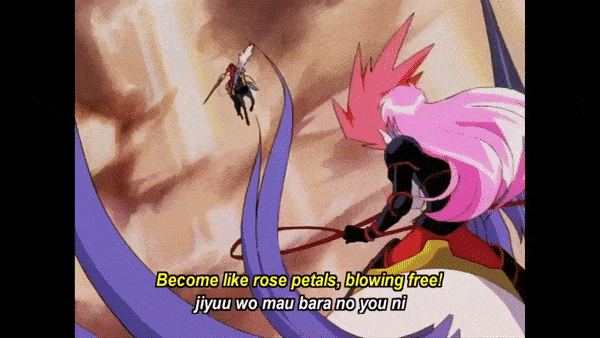
Become like rose petals, blowing free!
Honestly, that part was a bit difficult to interpret. We do see petals blown in the wind when Utena beats boys at basketball, but the only time I saw them concerning Anthy (and by association, the duels) was when the Duelist gets “deflowered”, and I didn’t get a feeling of freedom from it. Or so I thought at first. Knowing that the duels are part of Akio’s plot which is nothing but a wild goose chase, it makes sense in the context that losing means some time away from Akio’s control and thus, a chance to reflect and for self-improvement. Also, if the dueling arena is like a groomed flower, then its rubble is the petals. This might be foreshadowed in Episode 9, when Anthy falls with rose petals scattered everywhere as Utena tries to catch her.
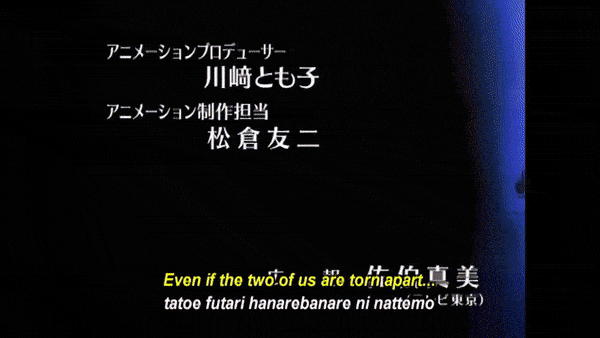
Even if the two of us are torn apart…
…I swear that I will change the world.
We have a return of Even if the two of us are torn apart… (Let go of me…) / …take my revolution. This time, there’s no request to let go of the other party and Utena is taking the next step toward (self-)improvement. If you pause at the right time, you can see she is not in a fetal position like at the beginning of the opening. Now, it looks like she is opening herself to the real world.
Anthy is not present, but that’s because she hasn’t reunited with Utena yet. Until that day comes, the latter will keep fighting for the world both deserve to live in.
In conclusion, the opening is a summary of the entire series and foreshadows how it would end.
#revolutionary girl utena#shoujo kakumei utena#rgu#sku#utena#utena tenjou#anthy himemiya#utena x anthy#anthy x utena#kyouichi saionji#juri arisugawa#miki kaoru#nanami kiryuu#touga kiryuu#prince dios#akio ohtori#revolutionary girl utena analysis#rgu analysis#revolutionary girl utena meta#rgu meta#rondo revolution#mine
118 notes
·
View notes
Note
Do you think Utena and/or Anthy would have gotten a wish from Kyubey (not at seventeen, maybe, but we know they were children once, and Anthy's power is quite... powerful)? Would they accept, what would they wish for?
I mean, the way powers work in P3M is not whether you start out with magical abilities, but how much "influence" you have over the lives of others. So you have Sayaka, who was a relatively ordinary girl who used her wish only to help a single person was very weak, versus Madoka whose existence was the focal point of multiple timelines.
However, potentially, both Utena and Anthy would be power houses by those rules. Anthy fuels Ohtori, which granted only influences a very small number of people, but she seals Dios's powers which is implied to have had a very strong negative effect on the rest of the world. Utena revolutionizes the world and ultimately leads to Anthy leaving and Ohtori collapsing, so not as powerful but no slouch either.
But what they would wish for... Well, depends when they get caught.
We know Anthy would wish to protect her brother/remove him from those who wished to use him. That's what she used her powers for canonically and aiding the memory of her brother/punishing herself is why she complies throughout the series in the dueling nonsense.
Utena's a little harder because what she wanted changed as she forgot things and is also sometimes more cerebral. Utena when her parents first die wants 'something eternal' she's just lost her parents and future, she's realized she herself is going to die, and everything is mortal and fragile. Shortly after, however, she wants to become a prince so she can free Anthy.
But I think we've seen that both would accept the wish given the extremes they go to in canon to reach their goals even when facing great adversity.
#puella magi madoka magica#puella magi madoka magica headcanon#puella magi madoka magica meta#revolutionary girl utena#revolutionary girl utena meta#revolutionary girl utena headcanon#anthy himemiya#utena tenjou#meta#headcanon#opinion
34 notes
·
View notes
Text
utena was no prince; she played the part of one— at a cost— but a major part of revolutionary girl utena examines how the socially constructed & enforced gender roles presented through the lens of fairytale archetypes cannot be divorced from gender subjectification under the patriarchy.
as a feminist deconstruction, it explores how the role of the prince & the princess are often not actively taken upon but rather imposed onto All patriarchal subjects— but men, despite being patriarchal subjects, also actively maintain cisheteronormative social relations of control under patriarchy, so their princehood keeps the princess caged in the confines of the patriarchal system. they 'save' the princess & keeps her from saving herself.
the prince is far from the Idealized Masculine. princehood in practice is that of dominating the princess & the maintaining of the role of the prince is antithetical to the themes of the entire show. utena is not a prince - not because she is a girl, but because she is revolutionary, and princes are anything but in the world of revolutionary girl utena.
utena was revolutionary because she was neither the princess (a role others keep trying to force her into) nor the prince (a constructed, misogynistic ideal); the revolutionary act she did to 'save' anthy was simply loving & caring for her, not princely notions of nobility.
#el media analysis#shoujo kakumei utena#revolutionary girl utena#revolutionary girl utena meta#utena tenjou
65 notes
·
View notes
Text
Yukio Mishima's House in Ohtori Academy
Lmao Utena fans in 2001 like 'the setting is an anachronistic western style of archi-'



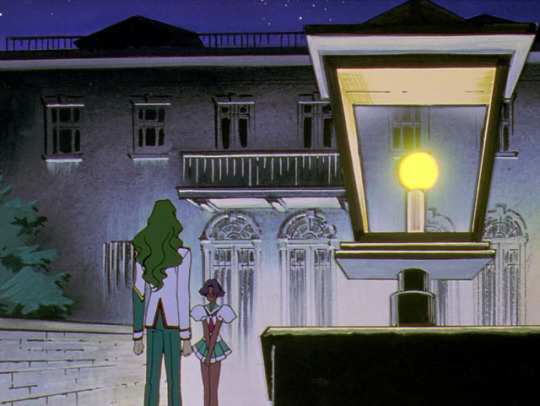

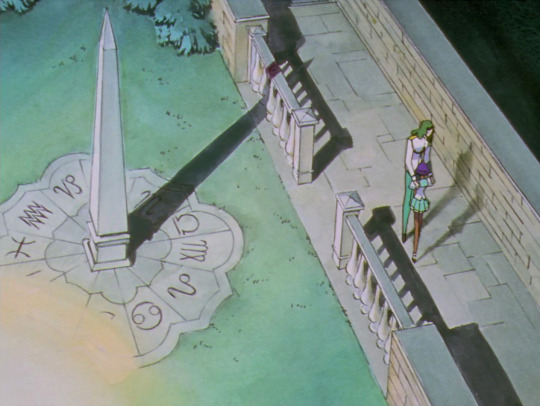

#Utena#Revolutionary Girl Utena#RGU#Sku#Utena meta#Utena analysis#Yukio Mishima#Lmao welcome to the wide world of problematic faves ig
2K notes
·
View notes
Text
saionji and utena have the funniest relationship and some of the most twisted parallels. yes meeting you as a child permanently altered the course of my life but now you're trying to steal my girlfriend so I hate you. I think you're laughable for not performing gender presentation in the way that you should but really that's just projection because I'm doing the same thing. you are everything I hate about myself so I find you repulsive. we both have a short temper but my anger is righteous and yours is toxic. touga has a weird psychological hold on both of us and I'm strangely jealous of you for that but I won't admit it because I also hate touga and want him to leave me alone. wakaba is just a friend; it's okay for me to ignore her feelings because you are the one she really likes. you're not good for himemiya, she needs me. I love himemiya, so it doesn't matter how I treat her. and she loves me too, okay? I'm different from the rest of you. I'm different.
898 notes
·
View notes
Text
rewatching utena for the first time in about a decade and it is truly the funniest show ever.
we just finished the black rose arc, the last ep was truly a mindfuck. mikage completely succumbing to his delusions and unable to tell memory from reality, finding out he's been frozen in time for decades, mamiya has been dead all this time and anthy was pretending to be him. mikage is defeated and expelled/set free from ohtori, the existence of his life and of nemuro memorial hall wiped from everyone's memory.
then the following episode is a recap. and maybe you're thinking, whew, this arc was a doozy, it'd be nice to have it broken down into a nice, digestible 20 minute episode that'll really help me understand and process things! AND THEN THE ENTIRE RECAP EPISODE IS ABOUT NANAMI AND HER GOOFY SHENANIGANS OH MY GOD.
'wait so what's real and what isn't, how long was mikage trapped there was anthy the one orchestrating this all along--' 'HEY REMEMBER WHEN NANAMI WAS BEING CHASED BY SURFING ELEPHANTS IN INDIA???' it is so POINTEDLY and MALICIOUSLY unhelpful, it is truly the most king shit I've ever seen. it's broadcasting the clearest message possible that if you went into rgu expecting it to explain anything to you, it's not gonna happen. you are getting elephants instead. fuck you.
(this post was brought to you by @not-the-blue who is watching the show with me for the first time and has no idea what's going on, i just turned her frustrated-amused rant into a post❤️)
#utena#revolutionary girl utena#text#my rambles#well technically not-the-blue's rambles y'know.#utena spoilers#meta
540 notes
·
View notes
Text


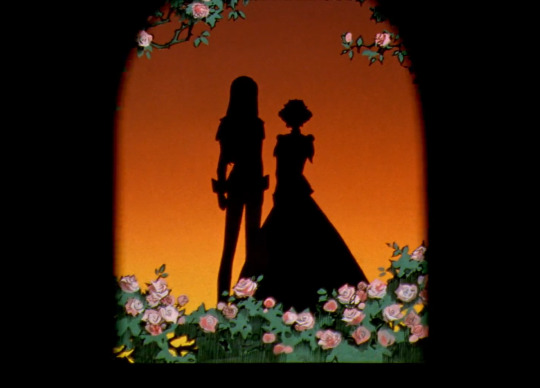
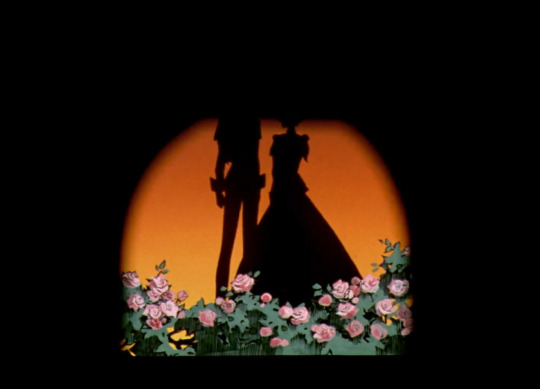
this ohtori arc elevator sequence is very reminiscent of an analogue film strip running through the projector. spectacle and simulation. architecture as framing device, the spatial ordering of life lines.
The lines we follow might also function as forms of 'alignment,' or as ways of being in line with others. We might say that we are orientated when we are in line. We are 'in line' when we face the direction that is already faced by others.
Sara Ahmed Queer Phenomenology
#queer life as one that fails to make the gesture of normative return; an aberration from the straight line#revolutionary girl utena#rgu#rgu meta#sara ahmed#queer phenomenology#utena tenjou#anthy himemiya#knives
564 notes
·
View notes
Text
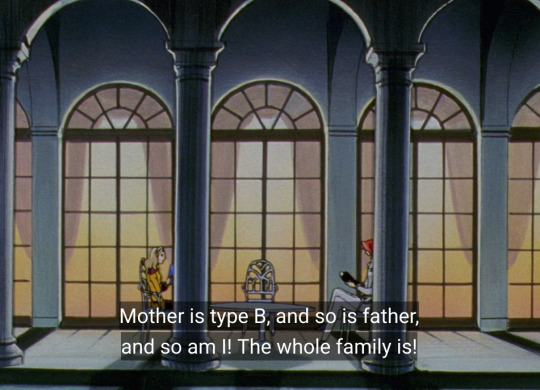

Word of God/movie backstory aside, it suddenly came to me that there is one other gap of knowledge that has probably contributed to a significant part of the alienation between Touga and Nanami, and it's something that existed throughout all of Nanami's life, so it's given that she wouldn't truly notice it: Touga knows they're adopted, Nanami does not. I think that makes a big difference.

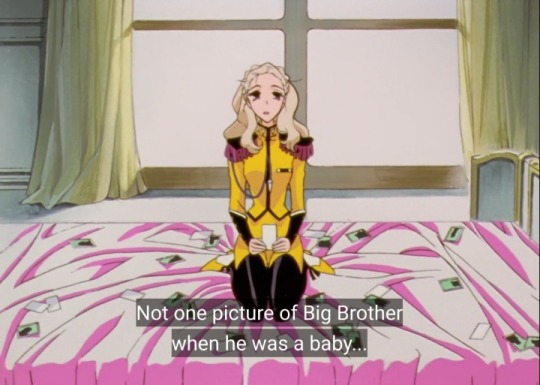
Touga's backstory is bound not to be the exact same as the movie (After all, Nanami isn't even there with him), so I'll let myself speculate a bit. Their biological parents could have died, they could have abandoned them or sold them, or the siblings could have been removed from their care, and unless Nanami was brought in later to wherever Touga was, it's safe to assume that he spent at least 5 years with his original parents. He has memories of a different family, and of losing that family. Nanami doesn't even know about any of it. She doesn't realize there is a side of her brother that she never got to meet.


"Blood" is very important to Nanami. Blood is what Nanami uses to try and reassure herself that the parents who are cold and distant to her, and the brother who's grown cold and distant too, have an eternal unbreakable bond. It's very brittle though. Nanami constantly fears being replaced, discarded or harmed by her family. Most often by Touga, who ironically, happens to be her only blood relative there.
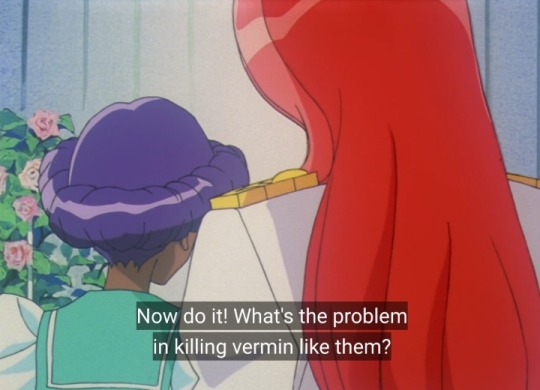
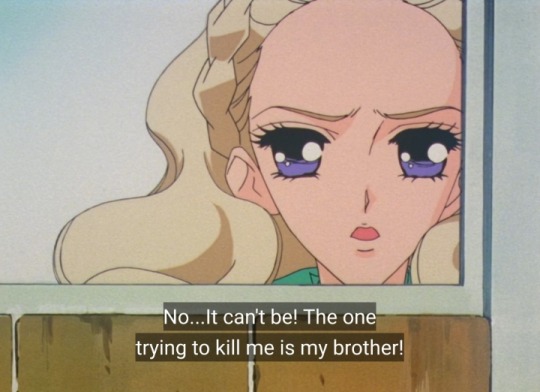
Her anxiety can be very easily explained by her experiences with how she was treated growing up in the Kiryuu household, but I do wonder if there's some subconscious parts of her that tap into these knowledge gaps too. I already felt like it was there, in the way her love for her brother is as protective as it is possessive, and how to protect him from harm, be it real or perceived, she can go feral, often shooting wildly at whoever she thinks is to blame, always hitting the wrong targets; and so maybe, I thought, it is possible that her anxieties are also tied to these repressed early childhood memories. Ones of once having a family, and then losing that world, being thrown someplace unfamiliar. Vague mostly forgotten memories fueling her fear of abandonment, working like a constant little nagging at the back of her head signaling to her how little blood ties really matter in the end.
"Blood" doesn't matter to Touga in the same way. He doesn't hold into a rose colored view of it. He knows by experience how easily those ties can be severed, how fickle they are. That's why when he found a little girl in a coffin, a little girl who spoke of there not being anything eternal, of how those you care about are bound to leave you, and questioning what's even the point of living then, he couldn't give her anything. He couldn't save her. He didn't know the answer for himself either.
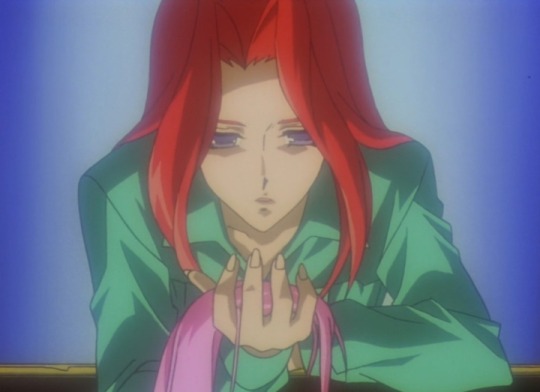
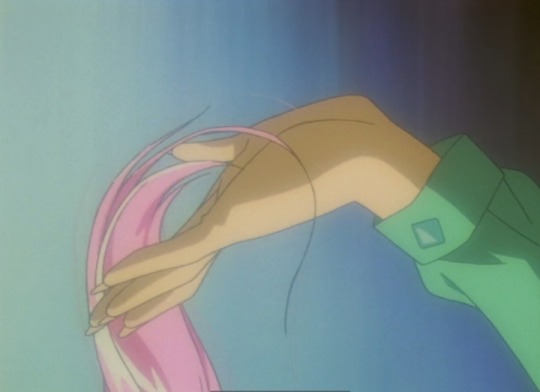
#revolutionary girl utena#shoujo kakumei utena#sku#rgu#utena meta#touga kiryuu#nanami kiryuu#utena tenjou#if someone could help me with the id for these pictures I'd really appreciate it 🙇#ambi utena post#utena analysis
160 notes
·
View notes
Text
A thing I really enjoy about RGU is how when producing the anime the crew was aware of the budget and limits that often come with TV shows at that time and created their own cinematographic language based on them.
The roses, the frames, the transformation sequences... Not only were they able to use them smartly but also make them reinforce the core themes of the show; that of repetition, circularity, a repeated movement, a revolution.
I personally greatly appreciate when narrative media is -meta- not in a direct way but in its semiotics. Utena creates this language based on repetition and is constantly seen subverting it, adding new "rules".
Episode 33 is cinematographicaly one of the episodes I find most interesting because they literally put the turning point of the story (I personally think of this episode as a turning point because we see Utena finally with her "prince"; except that, instead of the happy "ending" one would expect in traditional stories, it is here where everything comes into place and the grim reality is made perfectly aware. Were Utena a traditional princess story, episode 33 would mark a happy conclusion. Instead it is only the beggining of what lies inside the box and once opened it cannot be closed again) in an episode that is all about repetition. A recap.
Also, for as much as many people gloss over the Black Rose Arc I very much think it crucial to establish all of RGU's symbols. Because Utena doesn't tell us things, it wants us to learn them by noticing the patterns, by seeing the repetitions and where they are being broken, so that we ask ourselves why. The elevator sequence is one of such cases where we learn more of the characterization of these characters by seeing how they act inside of it. It's even a basic screenplay exercise: "how would your characters act trapped inside an elevator".
Mikage itself is a shadow, not just of himself but of Utena as well, an omen forever frozen in time.
Because that's another theme, shadows. And how in a way they are echoes, simplified and distorted repetitions of oneself.
And while shadows are cast in contrast, projections are cast forward. While one is a memory of something, projections are the reproduced illusion of it.
Utena works with parallels and repetitions and understanding their semantics and syntax allows us, the viewers, even subconsciously to feel their weight.
#just wanted to leave some of my thoughts out there althought these are clearly unorganized and probably on closer revision wont make sense#regarding shadows and projections we can also talk about the construction of self and how that ties to the theme of growing up and maturing#like I sair rgu has this whole narrative language that in closer inspection is just so brilliant#rgu#utena#meta#utena meta#revolutionary girl utena#analysis
101 notes
·
View notes
Text
akio and the coffin
it’s fascinating how akio both literally IS the coffin of ohtori academy and, simultaneously, is trapped by it. ohtori academy is in many ways a manifestation of the ugly side of adolescence, of clinging on to something in your past and refusing to move forward in your life. every character has something they continue to hold on to despite the fact that they ought to let it go for the sake of growing and maturing. for example, saionji has his inferiority complex regarding touga, his refusal to let go of the simplicity of their childhood together when he felt that they stood on the same ground, and that touga saw him as an equal. everything he does in the series is an attempt to make himself feel as though he is finally on equal grounds with touga. if he would only stop tying his self-image to the perception that touga is somehow above him, that touga looks down on him, then he would be able to let go of that sense of inferiority and move on. but he can’t. juri refuses to let go of the pain she feels regarding her past with shiori, and continues to see shiori as someone who is “innocent”, albeit cruelly - someone who is unknowing of the pain she causes juri through her actions when in fact, shiori in seducing the boy she thought juri loved was deliberately acting to hurt her. if juri would only realize and accept the true intentions behind shiori’s behavior, then she could get one step closer to understanding shiori, to being understood by her, and moving past the pain of shiori’s betrayal. but she can’t.
most of the characters, except utena and anthy of course, remain in ohtori by the end of the show. while they’ve all made progress in “maturing” thanks to the events they experienced throughout the series - both saionji and touga’s as well as juri and shiori’s relationships have gotten visibly better, as shown in the final medley of scenes - they still have more growing to do, hence why they remain in ohtori academy until their time comes. one day, the show suggests, they might also revolutionize their own worlds - their own selves - and finally leave the coffin of ohtori behind as well.
so where does that leave akio? i think he can be said to literally be the coffin of ohtori in that he is explicitly shown to try to manipulate others into remaining stagnant, to clinging on to whatever toxic things they are struggling to process and come to terms with, though this is of course only shown via the characters he most directly interacts with. naturally it comes across most clearly with anthy, although i think utena and to a less direct extent, touga, are the other two people who are the most straightforwardly influenced by him. when it comes to anthy, she clings to her love for the person her brother used to be, the older brother who, at least as she perceived, was kind and caring and wanted to protect people. to protect that older brother, she willingly took on the hatred of the world, and continues to endure the pain of it to this day for what is implied to be centuries. but akio has shown time and time again, through the repeating dueling cycles, that if he was ever kindhearted and genuinely caring, those parts of him are gone now. i do believe he cares about anthy to an extent even now, but whatever affection he has for her is paltry in comparison to his desire to reclaim his power as prince dios. it’s for that purpose that he set up the entire dueling system, for which he freely allows duelists to treat anthy like a prize and an object. and additionally, because anthy is so integral to the power he has now in ohtori, he uses emotional, psychological, physical, and sexual abuse to keep her tied to him. he’s willing to not just let her wellbeing come last, but puts it at the bottom of the list of priorities, and actively tears it down himself for his own benefit. anthy knows all this - but because she still holds onto that love that she had for who he used to be, she stays with him and does his bidding. and that’s what akio wants. he is the coffin, wishing to keep people in their states of despair, conflict, and pain, therefore ensuring that they are compliant and vulnerable to his manipulation.
at the same time, akio is trapped by the coffin like everyone else. he, like all the other characters, has something that he ought to move on from for his own sake as well as the sake of the people around him: his goal to reclaim his powers as prince dios. akio has failed in this goal every single dueling cycle that happened before the show’s events, and as displayed in the final episode, he definitively fails the one that takes place during the show as well. he can attempt the cycle over and over and over again, redo and tweak and modify the dueling system however many times and in whatever ways he wants - it’s all useless. there is no sword that can break open the rose gate. there is no way to reclaim his powers. they’re gone, that part of his life is over, and if he accepted that fact, it would allow him to move on and heal from what he experienced. but he can’t. at the very end of the series, right before anthy leaves ohtori for good, he’s typing away just as diligently as he ever did and, completely oblivious, tells anthy that he’s rewriting the rules of the rose crest, that he’ll be counting on her again. and i didn’t pick up on this until rewatching the episode, but it really just hits you then how utterly stupid he looks, working so hard and speaking so confidently about the upcoming dueling cycles as if any of them are ever going to matter in the slightest. i love anthy’s response to him too; i love the subtle but at the same time so blatant scorn in her words: “you really don’t know what’s happened, do you?” because once again, throughout all this, akio has learned nothing. he hasn’t realized it’s useless, what he’s trying to do; he hasn’t realized all the effort and pain and anguish he’ll cause in people for yet another dueling cycle will never make any difference. he is unable to come to terms with the reality that he will never have his powers as prince dios back. he refuses to move on.
akio is the coffin of ohtori, wanting to keep others in stagnation and regret. he’s also trapped by the coffin, incapable of maturing past his own stagnation and regret. and it really, really says something that all of the other major characters of the show, who have been in ohtori for far shorter a time than he has, have been able to make visible strides in their growth. anthy, who is the only one comparable to akio in terms of duration at ohtori, revolutionizes her world and leaves. meanwhile akio, as deluded and self-unaware as he is, hasn’t made a single step of progress in all this time. the only thing he does is call in bewildered desperation after anthy as she finally leaves him behind, still totally clueless as to what has happened.
tldr; i once saw an author say one of her characters represents inertia, in fact he is inertia. i think that’s a spot-on explanation of akio, at least in terms of what he symbolizes in the story. i want to beat him in the dick with a cactus
#revolutionary girl utena#rgu meta#shoujo kakumei utena#saito chiho#chiho saito#ikuhara kunihiko#kunihiko ikuhara#akio ohtori#ohtori akio#akio rgu#rgu akio#anthy himemiya#himemiya anthy#anthy rgu#rgu anthy#touga kiryuu#kiryuu touga#touga rgu#rgu touga#kyouichi saionji#saionji kyouichi#saionji rgu#rgu saionji#juri arisugawa#arisugawa juri#shiori takatsuki#takatsuki shiori#juri rgu#rgu juri#utena
191 notes
·
View notes
Text
Utena – Parallels and beyond them
As the series progress, we see that not only Utena’s and Anthy’s respective journeys share similarities, but with the former going through beyond the limits of Dios, she had helped the latter overcome the ones imposed by End of the World.

Once upon a time, years and years ago, there was a little princess, and she was very sad for her mother and father had died.”
“[Anthy] sacrificed herself to save her beloved prince even though she was the only one who truly loved him. And yet, the prince she loves is no longer the prince she knew. Not anymore… He is now End of the World…”
Both are little girls who had experienced a tragedy. The aftermath is glossed over with a fairytale-like narrative and the truth is so much alarmingly darker. Utena was not only grieving, but also losing the will to live and Anthy protected her brother from the expectations of entitled people (and said brother would later become one of them) at the cost of her personhood. Based on the imagery of coffins associated with them, I say both were at that point (symbolically/mentally) stuck between life and death.

Before the princess appeared a traveling prince riding upon a white horse.
“By all means, stay in this cozy coffin of yours and continue to play prince.”
Fairytales present the prince as the perfect man embodying everything a woman supposedly needs to be happy, but as the saying goes, nobody is perfect. Therefore, princes do not exist and will remain a fantasy. While dreaming/fantasizing is not bad, that must not blind us to reality or else we will not see that the Prince Charming riding his white steed is only a patronizing and entitled man-child playing prince on the horse of a carrousel. Utena came to Anthy by taking the most perilous path and with nothing but her determination and her love for Anthy instead of walking on the easy path or by riding a steed to make her journey less arduous.
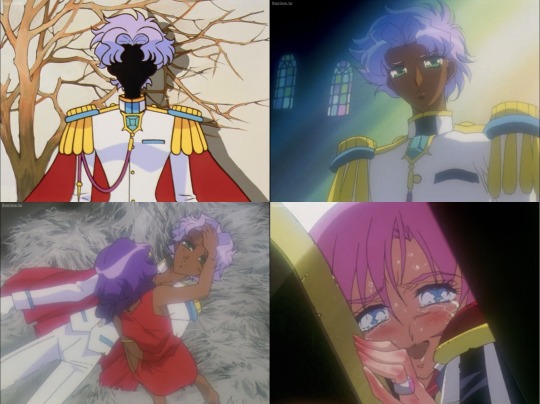
He had a regal bearing and a kind smile.
“Himemiya…at last, we meet…”
The first time Dios appeared before Utena, he had light above him like a halo, giving the viewer(s) the impression of a heavenly entity here to save her which is reinforced with the fact it happened in a church. However, unlike in the fairytale prologue, he didn’t give Utena a kind smile; he only asked her what she was doing in her current position before turning his back to her and leaving. Maybe he knew she would follow him to where Anthy was, but he didn’t appear princely in doing so. Except, that’s the point, isn’t it? In the movie, the prince was the Devil turned into one by Anthy’s power. Dios was actually Akio’s persona. As a prince, Dios MUST have a regal bearing and a kind smile, and MUST present himself like that to EVERY girl in the world (like a Japanese idol). The Prince Charming is not real and no one can reach his level of perfection. By not acknowledging that fact, people’s expectations put immense pressure on boys and they grow to believe that they cannot show their imperfect selves to the world or if they give up, the bitterness of their failure turns them into Akio, men who compensate their inadequacy with superficially cool stuff (cars, stylish clothes) and by oppressing others. However, in doing so, they ruin their chances to form genuine connections with others which explains Dios’s inability to be close to any girl he had saved to the point of not remembering any of their names. The only one whose name he knew was Anthy and she was the only one who saw his true imperfect self. When Utena appeared before Anthy, she came with a light projected from above her too, but it did not give the impression of a higher power like how Dios’s did. Hers was smaller, but it still carried a feeling of hope and liberation. In addition, unlike Dios, Utena didn’t appear regal at all: her dueling uniform was in tatter, her fingers were bloodied and her face was red and sweaty from crying and exhaustion. However, her smile was kind and meant for ONLY Anthy. Utena did not care about how she looked like as long as Anthy got the help she needed and knew how much she loved her.

The prince wrapped the princess in a rose-scented embrace and gently wiped the tears from her eyes.
“Himemiya, give me your hand!”
A kiss from a prince seems to be romantic, but with the true context of Utena’s past, it appears less so. Utena’s tears hadn’t been from mourning for her parents, but from expressing compassion for Anthy who had to suffer for eternity. Faced with her tearfully begging to help Anthy, the Prince just wiped her tears and thanked her for her concern. In the end, he didn’t take away the cause of them and only gave her cold comfort. Tears are seen as a sign of weakness, but also of how humane one can be. After all, Utena’s tears are what reached the Anthy lying in her coffin. If Dios won’t give Anthy a hand, then Utena will do it (and literally at that)!

“Little one,” he said, “who bears up alone in such deep sorrow, never lose that strength or nobility even when you grow up.”
“No! Get out of here! The swords…!”
If we remember how Anthy got the title of witch, you’d see that it was because she had protected the one she cared most even if it meant braving the anger of the entire world; and she’d rather continue her eternal suffering than let Utena become another target of the swords as well. It shows that she possesses as much strength and nobility as Utena (only buried under layers and layers of trauma and bitterness). Both had carried a “deep sorrow” and had been thrown at so many hardships, but that is part of growing up and they had succeeded in overcoming them.
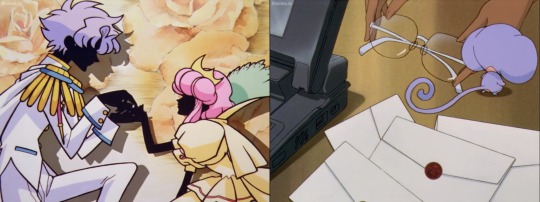
“We will meet again. This ring will lead you to me one day.”
Perhaps the ring the prince gave her was an engagement ring.
“[…] I have to go now. [Utena] isn’t gone at all. She merely vanished from your world.”
Dios and Anthy are sure that a reunion will happen. What makes it interesting is the how. In old time, men gave engagement rings to women not as a romantic gesture, but as an indication that she was now PROPERTY of her fiancé (and isn’t it interesting that we can say the same for the other Duelists, especially the male ones?). As long as Utena wears that ring, she is his to do whatever he wanted. In other words, he had ensured that she would meet him again by physically bounding her to him. Meanwhile, Anthy had nothing but her belief in meeting Utena again, but like Dios said, she needed “a prince she can believe in” only the prince part was unnecessary. Anthy’s position in the first place had been because the prince role was killing her brother. One was dying of exhaustion and the other was the target of everyone’s hatred, both caused by an unjust oppressive system. When both sides are suffering from the latter, then shouldn’t the solution be to change it for something better? So Anthy didn’t need a prince, but someone who can inspire her to believe in the existence of a world beyond her coffin and to walk out of it.
(Do you notice that while the first promise of reunion was made by putting a ring, (a chain) on Utena, Anthy made hers by removing her glasses which symbolized the chain that bound her to Akio?)

[S]o impressed was she by him, the princess vowed to become a prince herself one day.
“I’ll become her prince and save her! […] I swear!”
“This time it’s my turn to go. No matter where you are, I swear I’ll find you. Wait for me, Utena.”
And finally, the mark left by that one meeting. Utena wanted to become a prince because Dios supposedly left an impression on her, but thanks to the MOST BEAUTIFUL plot twist in anime history, we find out that her reason was actually to save Anthy from her eternal torment. Dios did not give back her will to live; she chose of her own volition to leave her coffin in order to help a girl who was eternally suffering in hers. Of course she didn’t remember everything correctly years later and modeled herself after the princely ideal she thought Dios represented, but her subconscious, through the ring, reminded her of the promise she had made to Anthy. Utena turned the ring that symbolizes the patriarchal objectification of women into a mark of female solidarity. Without realizing it, she did more than becoming Anthy’s prince: she became her friend, her support system. And Anthy gradually allowed Utena to occupy a place in her heart. That fondness grew into love and that inspired her to leave Akio and his abusive ass. She also didn’t change her appearance to be like Utena (which had been based after the princely ideal so that would have been a vicious cycle).
They helped each other leave their respective coffins. Anthy may not know everything like Utena in the beginning, but as she progresses in her quest to find her beloved, she will discover the flawed, yet authentic world beyond the fabricated one of Akio/patriarchy.
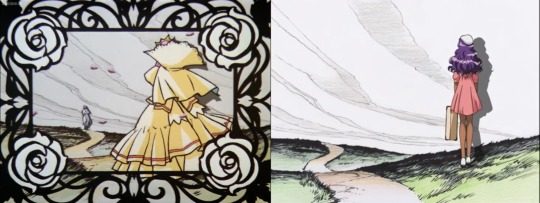
(And fairytale!Utena is just watching Dios riding into the horizon while Anthy is walking forward to reunite with Utena.)
#revolutionary girl utena#shoujo kakumei utena#rgu#sku#utena#utena tenjou#anthy himemiya#anthy x utena#utena x anthy#akio ohtori#prince dios#revolutionary girl utena analysis#rgu analysis#revolutionary girl utena meta#rgu meta#parallels#prince charming#mine
931 notes
·
View notes
Note
Do you think the world of Utena (or at least Ohtori) is without homophobia?
God no.
That's kind of the point of the anime, the film, and every adaptation I've seen.
The fantasy world of Ohtori is strictly defined by gender roles and even when you defy them, you better defy them in the lanes defined by the world, e.g. to not be a Rose Bride Utena has to become a Prince, there is no in between that is allowed within Ohtori.
Utena is allowed to be a prince and take Anthy for the Rose Bride but it's allowed in a very strict manner and we later learn that what Utena is doing is not kosher per the laws of Ohtori.
Even Utena choosing to be a prince, to dress like a man, is constantly brought up by other characters. The teachers try to get her to wear the female uniform, the other students try to get her to wear the female uniform, it's a constant thing that's brought up.
Ohtori, we learn as we progress through the show, is a prison that must be escaped or else the inhabitants will perish without being born.
As for the outside world, the beauty is we never find out, it's this mysterious thing outside the realm of adolescence that is hinted at being terrifying, wrong, and nothing like the magic of Ohtori.
As for Ohtori itself, incredibly homophobic, just as it's incredibly misogynistic, but it's supposed to be, that's the point of the show.
#revolutionary girl utena#revolutionary girl utena meta#revolutionary girl utena headcanon#utena tenjou#ohtori academy#meta#headcanon#opinion
34 notes
·
View notes
Text
I finally finished my Utena re-watch yesterday, binging the last three episodes and Adolescence in one evening, and I am Having Thoughts. Mostly about the story from Akio's perspective, surprisingly.
I don't know if I've ever read anyone's exploration of the story from his pov, so I'm going to brain-vomit about it.
From his pov, he's the one who's trapped. The Rose Bride sealed Dios away from the world, whether for his own good or to keep her brother to herself, or both. The princely part of him, Dios, is trapped, leaving only the human part of him, Akio, out in the world, trying to regain what he's lost and cope without what he sees as his 'real' power. 'The power to revolutionise the world' is, for him, the regaining of his heroic princely aspect that made him something close to a god among mortals, a natural leader, the greatest warrior.
So what is he left with? What does a regular human man have with which to find his place in the world? What is his role, if not a prince? Is he a ladies' man? An intellectual? A fighter? A logical realist who denies the 'miracles' the prince could perform to keep people safe?
It's clear from the Black Rose arc, and from the final scenes, that Akio has repeated the duels in some form many times, assuming that he needs the right sword to open the Rose Gate and access his old power. He holds this 'might makes right' belief that physical strength or a warrior's weapon is the key to power. When Utena, just a girl, succeeds as the winner of the duels, at first he tries to persuade her to stand down, because how could a girl's sword possibly be strong enough to open the Gate? I wondered, during this watch, if this cycle was the first time that any girls had taken part in the duels, and whether that was by design or accidental. In the Black Rose arc, it's 100 boys who are drawn in to find the power or the eternal something. In this latest cycle, it's the student council, a power structure that represents intellectual masculinity: Juri, as a lesbian in a uniform closer to her male counterparts than to the other female students, might possibly have been the first girl to join the duels, an unintentional outcome perhaps inspired by Mikage, who was more easily tempted by a boy than by that boy's older sister. She still represented an aspect of masculinity in her own way, as the logical realist who denies miracles. Likewise, Nanami joins the duels initially to stand in for her brother, and leaves when she is confronted by how damaging the system is to the very people it's supposed to protect.
I wondered if perhaps Utena was never meant to join the duels. If Dios had meant to find Touga and Saionji on that particular day, and stumbled on Utena because they did. If Utena joining and winning the duels was never part of Akio's plan, and that's why he, and all the others, are so perplexed by her and never figure out how to get the better of her. Akio tries to force her into the role of 'Girl' because all he knows is playing the role of 'Man', and what else is a man supposed to do with a girl besides protect her or seduce her?
Utena succeeds because, for all her talk about wanting to be a prince to rescue girls, she gives up that roleplay and acts of of genuine love and compassion. She succeeds in besting the Rose Bride's curse because she doesn't approach it like a man, trying to seduce, fight, or logic her way through, but by loving Anthy and by having the compassion to want to end her pain.
Utena is still very much about smashing the patriarchy (literally in the case of Adolescence), but in its own way it also artfully deconstructs the ways in which patriarchy hurts men too, by limiting the roles available to them. Utena offers an alternative to the masculine roles of warrior, lover, intellectual and cynic, as well as to the feminine role of princess. The student council recognise it in the end, but Akio never does, because he is so utterly stuck in his role. That's why Anthy gets to leave at the end, telling him he's the one that's trapped, because Utena showed her that she, and we, can choose our own roles.
270 notes
·
View notes
Text
Welcome to Something Eternal: A Website Forum in 2023 wtf lmao
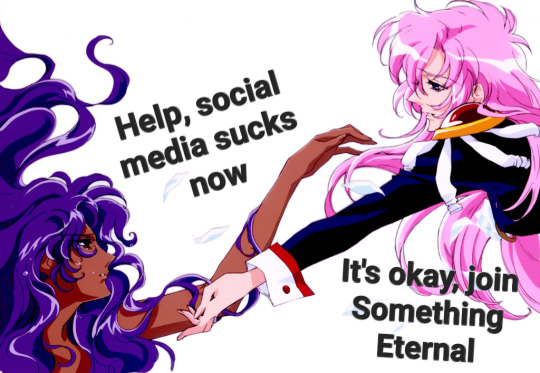
It's 2023, and a single belligerent rich guy destroyed one of the primary focal points of uh...global communication. Tumblr is, shockingly, kinda thriving despite the abuse it gets from its owners, but that I will call the iconic refusal of Tumblr users to let Tumblr get in the way of their using Tumblr. Reddit killed its API, removing the functionality of mobile apps that made it remotely readable (rip rif.) Discord, our current primary hangout, has made countless strange choices lately that indicate it has reached the summit of its usability and functionality, and can only decline from here as changes get made to prepare for shareholders. (NOTE: WROTE THIS POST BEFORE THEIR MOBILE "REDESIGN" LMAO)
The enshittification is intense, and it's coming from every direction. Social media platforms that felt like permanent institutions are instead slowly going to let fall fallow incredible amounts of history, works of art, thought, and fandoms. It kinda sucks!
A couple years ago, I posted about a new plan with a new domain, to focus on the archiving of media content, as I saw that to be the fatal weakness of the current ways the internet and fandoms work. Much has happened since to convince me to alter the direction of those efforts, though not abandon them entirely.
Long story short? We are launching a fucking website forum. In 2023.
If you remember In the Rose Garden, much about Something Eternal will be familiar. But this has been a year in the making, and in many ways it's far more ambitious than IRG was. We have put money on this. The forum is running on the same software major IT and technology businesses use, because I don't want the software to age out of usability within five years. It has an attached gallery system for me to post content to, including the Chiho Saito art collection. It has a profile post system that everyone already on the forum has decided is kinda like mini Twitter? But it is, fundamentally, a website forum, owned and run and moderated by us. We are not web devs. But we have run a website on pure spite and headbutting code for over twenty years, and we have over a decade of experience maintaining social spaces online, both on the OG forum, and on our Discord. Better skilled people with far more time than we have can and will build incredible alternatives to what is collapsing around us. But they're not in the room right now. We are. And you know what? Maybe it's time to return to a clunkier, slower moving, more conversation focused platform.
You're not joining a social media platform with the full polish of dozens of devs and automated moderation. Things might break, and I might need time to fix them. The emojis and such are still a work in progress. Because e-mails no longer route in reasonable normal ways, the sign-up process instead happens within the software, and has to be approved by mods. Design and structure elements may change. Etc. The point being, that the forum isn't finished, but it is at a place where I feel like I can present it to people, and it's people I need to help direct what functions and things will be in this space. You all will shape its norms, its traditions, its options...choices I could try to make now, but really...they're for us to create as a group! But the important stuff? That's there. Now let's drive this baby off the damn lot already!
Come! Join us!!
PS. As always, TERFs and Nazis need not apply.
#revolutionary girl utena#shoujo kakumei utena#rgu#sku#empty movement#utena meta#fandom stuff#fandoms#expect a somewhat spicy atmosphere#empty movement has always had deep something awful roots#and i expect the migration back to a forum will bring with it some of that more spicy attitude#also lol henry kissinger is dead god that rules
1K notes
·
View notes
Text
It's interesting to me that Akio/Dios are portrayed so differently in the movie vs the anime. Broadly speaking, in the anime Akio is a menacing figure (albeit charming at times) and Dios seems more benevolent.
Whereas in the movie Akio is kind of a joke?? His flipping over the car hood is silly and dainty and frilly instead of this display of sexual power, he's full on panicking because he doesn't have as much control over Anthy as he thought, he's lost his keys, he falls out of his own window.
And in the movie, it's Dios who is scary, and appears at the end of the car chase to intimidate Anthy into going back. Dios is the final boss.
And since I interpret the movie as from Anthy's POV/in her headspace, I see that as a reflection of how she views Akio in the present vs Dios in the past.
Akio, as of the end of the anime, is not someone who Anthy respects anymore. He's foolish, because he didn't see the meaning in Utena's actions, and she sees that all his posturing is just that: posturing.
Dios, though? Dios is the one she loved, and cared about, and did everything she ever did for. Dios was Anthy's prince, and to leave the school isn't just to leave Akio, it's also to leave behind this idealized memory of what he was-- and, by extension, what Anthy was with him.
It's important to note that Anthy never really wanted to be saved from Akio. She wanted "a prince she could believe in," and that was Dios until he "became" Akio (however you choose to interpret that). Later, she saw Dios in Utena-- a new prince she could believe in, even if she couldn't bring herself to do so until the last moment.
But I think the point which the anime alludes to and which the movie hammers home is that Dios is NOT Anthy's savior, he's a piece of her prison. She needs to overcome and outgrow him as much as she needed to overcome Akio.
#and in conclusion thats why utena turned into a car jesus christ this fucking movie#but seriously anthy run him the fuck over#rgu#revolutionary girl utena#rgu adolescence#mine#meta
122 notes
·
View notes